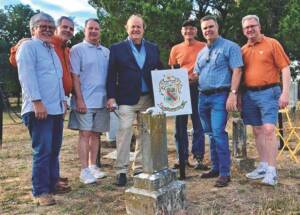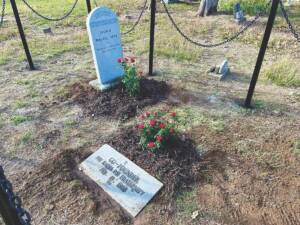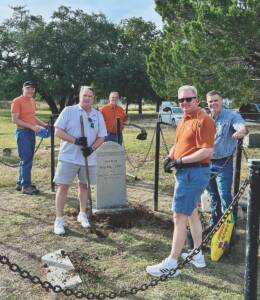HONORING OUR CO-FOUNDER:
TEXAS ALPHA ALUMNI JOURNEY TO LETTERMAN GRAVESITE
By Brent Monteleone Texas ‘84
It is a notably rare occasion when a brother in Phi Kappa Psi can visit the final resting place of the Noble Fraternity’s co-founder, Dr. William Henry Letterman W & J 1852, at the lonely, old country cemetery of Duffau, Texas. Located about 80 miles southwest of Fort Worth, Duffau typifies the rolling hills and plains of north central Texas.
 On the beautiful Saturday afternoon of Nov. 16, 2024, seven Texas Alpha alumni enthusiastically took that opportunity to honor our founding father. Attending were: Neil Bowie ’83, Scott Connell ’83, Steve Eisnaugle Ohio State ’80 (Texas ’82), Robert Meyer ‘79, Brent Monteleone, Bryan Muecke ’75, and Jerry Tucker ’81.
On the beautiful Saturday afternoon of Nov. 16, 2024, seven Texas Alpha alumni enthusiastically took that opportunity to honor our founding father. Attending were: Neil Bowie ’83, Scott Connell ’83, Steve Eisnaugle Ohio State ’80 (Texas ’82), Robert Meyer ‘79, Brent Monteleone, Bryan Muecke ’75, and Jerry Tucker ’81.
Our group first thoroughly spruced up the gravesite. We mowed, fertilized, scrubbed the gravestone and Phi Psi marker, removed rust from and painted the fence posts and chains, and planted roses. The result was a tremendous visual improvement of the Letterman gravesite.
 Getting to the heart of the trip, we honored our co-founder by conducting the Fraternity’s national burial ritual, modified to fit the circumstances. Brother Muecke (former SWAG 1980-84) presided over the ceremony. He also provided a canvas of the Phi Psi crest painted by his daughter, Kendra. This was a deeply moving experience for all.
Getting to the heart of the trip, we honored our co-founder by conducting the Fraternity’s national burial ritual, modified to fit the circumstances. Brother Muecke (former SWAG 1980-84) presided over the ceremony. He also provided a canvas of the Phi Psi crest painted by his daughter, Kendra. This was a deeply moving experience for all.
Following the ceremony, we marked the occasion with a toast of fine spirits and recounted Brother Letterman’s remarkable life and history — including the unlikely story of just how a Pennsylvanian came to be buried at the young age of 48 in this out-of-the-way cemetery near a Texas ghost town. The highlights follow for the benefit of brothers who may only be learning this interesting and tragic story for the first time.
Brothers Letterman and Charles Page Thomas Moore founded the Fraternity at Jefferson College in Letterman’s hometown of Canonsburg, Pennsylvania, on Feb. 19, 1852.
Following his graduation, Letterman earned his medical degree from Jefferson Medical Center in Philadelphia and then began his career in Baltimore.
Unfortunately, Letterman developed a long-term illness, and in 1875, sought a better climate in Prairie Home, Missouri. He then decided in 1878 that the warmer weather in Texas was more favorable for his condition. He briefly relocated his family to Dallas before they traveled farther southwest for the mineral wells near the small but optimistic town of Duffau. This town was the planned site of a westward railroad line, but instead it was built 8 miles south in Hico. Sadly, by the 1890s Duffau had begun its long decline.
But Brother Letterman made an immediate impact during his brief stay in the community. Arriving in town with letters of introduction from prominent men back east, he promptly organized the county and district medical associations, serving as the latter’s first president. He was also a member of the Northwest Texas Medical and Surgical Society. Having become a Freemason back in Baltimore in 1868, Letterman also helped organize the Masonic Lodge in Duffau.
However, his health worsened. After an aborted and arduous trip to the Texas gulf coast seeking relief, having shown notable grit in making it as far south as Austin, Brother Letterman died on May 15, 1881, and was buried in Duffau. His wife and child eventually returned to Missouri, where the Letterman family, including multiple generations of Phi Psis, continued to reside. And that is how the co-founder of Phi Kappa Psi ended his days in rural Texas, far from his native Pennsylvania.
Following this story of Brother Letterman’s admirable life, our group also recounted the tale of how Texas Alpha undergraduates discovered and renovated his isolated grave for the Fraternity’s centennial in 1952 — including the placement of the stone marker noting Letterman’s co-founding of Phi Kappa Psi, placement of the poles and chains, and how the crumbling headstone was replicated for the grave and the original headstone presented to Letterman’s descendants at the centennial GAC in Pittsburgh.
While still at the grave, we then honored the memory of a few Texas Alpha brothers we all knew, touched on the significance of the Fraternity to our lives, and laughed over several great Phi Psi stories. After about three hours, we closed with rousing choruses of “Shall We Gather at the River” and “Amici.” The former, a famous 19th-century Christian hymn, was written by a Phi Psi — Robert Lowry, Bucknell 1856. A Baptist minister and noted composer of gospel music, Brother Lowry was the Fraternity’s second national president from 1888-90.
 In addition to the events at Brother Letterman’s gravesite, the seven of us also had a fun weekend in Hico, a fantastic little renovated town. We learned that people come from all over for its excellent hotels, restaurants, shops, and bars. This charming slice of small-town Texas makes a fantastic home base for any Phi Psi’s trek to honor our co-founder.
In addition to the events at Brother Letterman’s gravesite, the seven of us also had a fun weekend in Hico, a fantastic little renovated town. We learned that people come from all over for its excellent hotels, restaurants, shops, and bars. This charming slice of small-town Texas makes a fantastic home base for any Phi Psi’s trek to honor our co-founder.
Many thanks to Brother Neil Bowie for originating this idea of visiting Brother Letterman’s grave and to all the brothers who attended, brought supplies for sprucing up the grave, provided historical information, and supplied items for the ceremony and good spirits afterward.
Our visit to the Duffau cemetery was simply an outstanding weekend in every respect — full of brotherhood, college football, and most importantly, a very special event to pay our respects to our Fraternity’s national co-founder. It is a striking thought that 144 years after his passing, Brother Letterman and his legacy in the Fraternity brought a group of old friends together in his memory many decades after college in such an out-of-the-way locale. He may be surprised by our gathering but certainly is pleased. Rest peacefully in Chapter Eternal, our good and faithful servant.
Do you have some throwback photos, vintage T-shirts, or chapter house memorabilia to share? Let us know: marketing@phikappapsi.com

